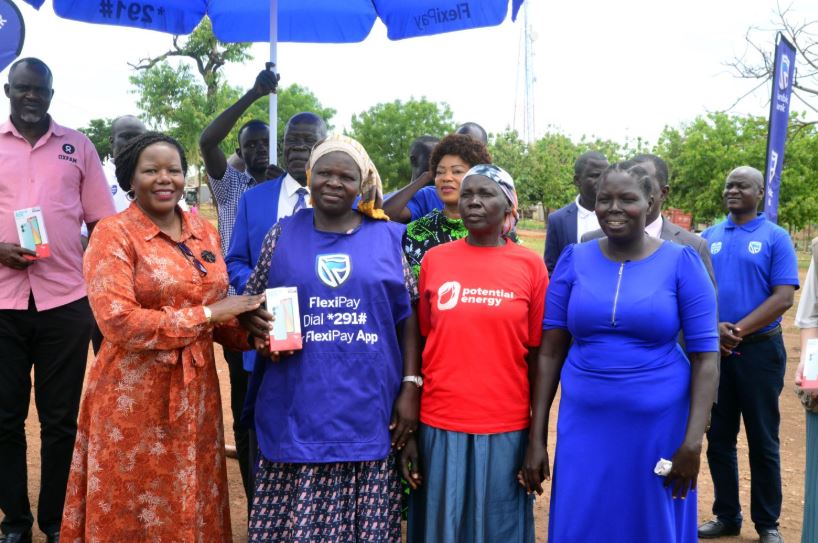
Stanbic Bank Uganda, in partnership with UN Women, recently launched a transformative program aimed at empowering women in the West Nile region.
The initiative, part of Stanbic Bank’s flagship program Stanbic for Her, targets both refugee and host communities, providing digital inclusion, financial literacy, and sustainable livelihood support.
To promote digital financial inclusion, Stanbic Bank donated smartphones to selected community members, primarily women, which they will use to attain a variety of services.
The phones will support mobile banking, digital record-keeping, and savings, helping participants overcome the long distances to the nearest financial institutions.
Speaking at the function, Catherine A. Poran, the Chief Executive of the Stanbic Business Incubator (SBIL) said, “Our work in West Nile is grounded in the belief that inclusive development must tackle systemic barriers. Through Stanbic for Her, we are proud to deliver targeted support to communities that need it most,” Poran said.
“Distance to a bank shouldn’t be a barrier. With digital tools, we’re enabling these communities to build financial resilience and autonomy,” she added.
Dr. Paulina Chiwangu, the UN Women Country Representative in Uganda, underscored the need for gender-responsive and inclusive humanitarian responses.
“Our partnership with Stanbic Bank demonstrates the power of collaboration. The COVID-19 pandemic exposed the extent of the digital divide, especially for women. This program ensures women not only access livelihoods but are also meaningfully included in decision-making processes, with dignity and protection at the centre,” Dr. Chiwangu said.
Addressing Urgent Challenges
According to Poran, the program was developed following a needs assessment in refugee settlements, which highlighted a range of urgent challenges, including:
Limited access to financial services
Many women in the refugee camps lack access to basic financial services, making it difficult for them to manage their finances and plan for the future.
Early marriages and maternal health risks
The lack of menstrual hygiene products and other factors contribute to early marriages and maternal health risks, which can have serious consequences for women’s health and well-being.
Climate-induced food insecurity
Climate change has led to food insecurity in many refugee settlements, making it essential to provide support for sustainable livelihoods.
Empowering Women through Digital Inclusion
The program aims to promote digital financial inclusion by providing smartphones to selected community members, primarily women. This will enable them to access mobile banking, digital record-keeping, and savings, overcoming the long distances to the nearest financial institutions.
Supporting Maternal and Child Health
The program also addresses maternal and child health by distributing mama kits to support safe childbirth and reduce infant mortality. This is an ongoing concern in many of Uganda’s refugee settlements.
Promoting Sustainable Livelihoods
The initiative includes the planting of fruit trees to improve household nutrition, promote sustainable agriculture, and support reforestation efforts. This will contribute to the long-term sustainability of the program and benefit the community as a whole.
Supporting Girls’ Education
Poran noted that the program recognises the importance of girls’ education and menstrual hygiene. And that by providing menstrual hygiene products to adolescent girls, the program aims to keep more girls in school and give them greater control over their futures.
In Line with Stanbic’s WYF Agenda
It is important to note that this campaign is in line with Stanbic Bank Uganda’s WYF (Women, Youth, Farmers) agenda, which aims to uplift the standards of living of Ugandans in these demographics. By empowering women, the program contributes to the bank’s broader commitment to promoting economic growth and development, which also aligns with the objectives of the government of Uganda.
Model for Integrated Development
The partnership between Stanbic Bank Uganda and UN Women demonstrates the power of collaboration in driving long-term, measurable change. The program is a model for integrated development, weaving together technology, gender equity, health, and environmental sustainability into a cohesive, community-driven empowerment strategy.
The Stanbic for Her initiative, just like the Stanbic WYF, is a testament to Stanbic Bank Uganda’s commitment to promoting gender-inclusive development and empowering women.
By providing digital inclusion, financial literacy, and sustainable livelihood support, the program is poised to make a meaningful impact in the lives of women in the West Nile region.
